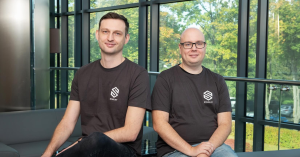Croatian entrepreneur Vedran Cindric is a skilled software developer with an impressive 18-year track record in PHP and MYSQL programming, and also an avid supporter of the local tech ecosystem in his country.
Wanting to solve the challenges that developers themselves face when developing APIs, in 2020 Cindric founded Treblle, an observability and analytics platform that helps engineering and DevOps consolidate and scale their APIs and APIOps. In the following years the company grows its portfolio of products and manages to raise $7M at the end of 2022.
In an interview with The Recursive, Cindric talks about what it is like to build meaningful AI products today, the engineering talent that is available in Croatia and across the rest of CEE, and what are the strengths and weaknesses of an developing AI ecosystem in the region.
The following interview was conducted as a part of The Recursive’s “State of AI in CEE” report. Download the full report with insights from 40+ experts and an analysis of 900 AI product companies from CEE here.
The Recursive: What are the key reasons for founding Treblle, and what challenges is the company currently addressing?
Vedran Cindric: I used to run a software development company here from Zagreb and we used to do a lot of app development, web development for companies run by brands like Porsche, Hugo Boss, Cisco, you name it. I used to run that for 10 years, and during the last five years, most of the projects started or ended with an API.
I’m close to being a developer myself, and every time I would develop an API, it would take me a week, I would spend three weeks providing support and helping other people use the API. So that’s where the original idea was born. I was getting so many questions about that. How do I integrate? How do I fix this? It’s not working for me. So I said, Hey, can we build up a tool that could help them see what they’re doing and stop asking me questions? So I say the first reason was probably quite selfish, I didn’t want to be bothered.
Essentially, that was the core idea, and that’s how we started. It was essentially, I would say that I wanted to democratize access to the actual API and the actual API data. And then that kind of spun out of control, and we pulled it out into a separate company and has been building it since then.
You recently launched the AI-powered API assistant Alfred, what’s the technology behind it?
Everybody’s been on this AI frenzy, and I think every startup that raised in the past few years, probably got a call from the investors about what they are doing AI-wise. Even though we like to follow the trends, I didn’t want to push something that made no sense. And the more we thought about how we incorporate AI and how we can use it to actually build a meaningful product – that’s where we kind of came up with this idea of Alfred, which is kind of based on Alfred from Batman.
Essentially what Alfred does is it understands the underlying API documentation, which we completely automatically generate for you. So the journey of our AI tool starts even before it because we generate the documentation for you. We give AI the AI model or the large language model your API documentation. It has an understanding of it, and it allows you to basically ask any question about that API documentation.
How has the Treblle product portfolio changed since launching and what trends are you following?
Originally it started as just one product, and that product was API interoperability. So my original idea was to give everybody else the same set of tools that I have to basically understand the API. And then we started adding things like automatically generated documentation, because people said it would be cool. So one of the two trends that we started following, and major trends that I think will be investing heavily in the future is security. We also launched a security product earlier this year that is specifically targeted at API’s.
There is an emerging AI innovation ecosystem in Croatia – what are the strengths and weaknesses that you’ve witnessed during the development of this ecosystem?
In recent years, there have been many startups including Treblle that have been able to get funding which is amazing news, but there’s also a lot of startups who unfortunately might not see the light at the end of this tunnel. But essentially, just like any ecosystem, there’s like really good companies and there are bad companies.
The good thing happening here is that investors are starting to realize, especially most of the investors that I’ve spoken to, that there is raw engineering talent in this region, especially in Croatia, that is being underutilized, underserved, and having them come in and unlock that potential with a lot of money makes a lot of sense, especially with companies like Fonoa raising 60 million, Cognism, ReversingLabs, all these guys who basically are really good at what they do and now having investors recognise that and having more trust in the region.
How would you evaluate the level of collaboration between AI companies and 1) academia and research institutions, and 2) the government?
I don’t think the collaboration between AI or non-AI startups in companies in Croatia with the Croatian government is happening. To be perfectly honest, maybe some are doing some small projects. But generally speaking, everything here is basically done by three major conglomerates. One of them, I think, is 50% in the ownership of the Croatian government and the other two are like two big IP providers that basically do absolutely everything. So if you even want to get started, you have to have in with one of those companies, so I don’t think that’s a very good and positive thing.
I think there is potential that could be unlocked. I know a lot of data is sitting in our research institute for Croatian language that could possibly help educate the large language models, for example, doing grammar checks on creation, and generating more precise content in Croatian. I think part of that is the problem is that the guy running the Croatian research institute does not understand that that’s a golden goose that he’s sitting on, and he doesn’t know how to move that needle.
How has funding and investor support affected the overall development of Treblle and what’s next for the company?
I think we were very lucky to find investors early on who were nothing but supportive of us since day one, and then the new US investors that put up 7 million in our last round. We have a lot of freedom there and they allow us to run the product and run everything pretty hands-free.
I think there’s a lot of trust that needs to come from both sides and it’s something that you work on, it doesn’t come given. Also, since I started in 2020 there has been a huge amount of increase from investors in Croatia.








